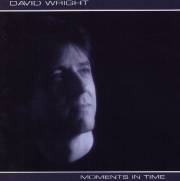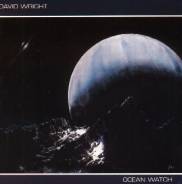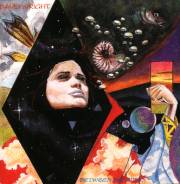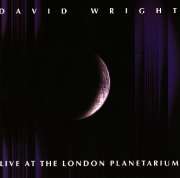 The British composer David Wright has become
internationally famous in the nineties as an innovative artist. His style, between New
Instrumental and Space Music, has a great melodic beauty and powerful atmospheres.
The British composer David Wright has become
internationally famous in the nineties as an innovative artist. His style, between New
Instrumental and Space Music, has a great melodic beauty and powerful atmospheres.INTERVIEW WITH
DAVID WRIGHT
By: Jorge Munnshe
 The British composer David Wright has become
internationally famous in the nineties as an innovative artist. His style, between New
Instrumental and Space Music, has a great melodic beauty and powerful atmospheres.
The British composer David Wright has become
internationally famous in the nineties as an innovative artist. His style, between New
Instrumental and Space Music, has a great melodic beauty and powerful atmospheres.
What are you currently working on? Can you tell us about your musical projects for the near future?
"I am working on a number of projects at the moment".
"My forthcoming album Hypnosis, which I hope will be ready mid February 98. This new album is quite different to previous ones. When I first composed the music I wondered about peoples reaction. But when I played the music live at a concert in 1997, the response was fantastic. Recording the album has been slow because of so many other commitments; ie solo and Code Indigo concerts.
"2. The new Code Indigo album, hopefully ready for April/May 98. We are very excited about this. Robert Fox and I were concerned that because For whom the Bell was so popular, (and took us two years to compose and record), that it might be difficult to recreate a second album to match it. Also, the band has undergone several personel changes in the last year, (Nik Smith is now back with the band). But the music for the new album is very different and we believe equally as good, if not better, than the first album! There is also likely to be much more exposure for Code Indigo in 1998 with the video, and a track from FWTB is appearing on a double album with artist like Enigma, Vangelis, Mike Oldfield, Alan Parsons, Kitaro, Jarre, etc".
"A double album album of previously unreleased and live material, including tracks from 1989/91 cassette releases. Album title is InADditions.
"4. A Code Indigo promotional video for MTV".
"5. Library music".
How your musical career began? Can you tell us about your collaboration with Robert Fox and other musicians in the band Code Indigo? How did you decide to work with them?
 "Robert and I have been friends since 1991. A mutual
friend introduced us because we both lost our first wives to cancer. Mine in 1989, Robert's
in 1990. We both began composing music as a direct result of that traumatic experience. Robert
and I first started writing together in 1993, when we performed a sell out concert for BBC
radio in Derby. We each performed a 45 minute solo set, but we opened and closed the
concert together with the two 15 minute pieces "Overture" and
"Finale", which appeared exclusively on the AD1995 Sampler CD. We
decided to write an album together in 1994, but we wanted it to be quite different to
"Robert Fox and David Wright" music. Writing
the music wasn't difficult. But trying to find the "different", distinctive
style we both wanted, was!"
"Robert and I have been friends since 1991. A mutual
friend introduced us because we both lost our first wives to cancer. Mine in 1989, Robert's
in 1990. We both began composing music as a direct result of that traumatic experience. Robert
and I first started writing together in 1993, when we performed a sell out concert for BBC
radio in Derby. We each performed a 45 minute solo set, but we opened and closed the
concert together with the two 15 minute pieces "Overture" and
"Finale", which appeared exclusively on the AD1995 Sampler CD. We
decided to write an album together in 1994, but we wanted it to be quite different to
"Robert Fox and David Wright" music. Writing
the music wasn't difficult. But trying to find the "different", distinctive
style we both wanted, was!"
"I have worked with guitarist Nik Smith for several years, and he is a key part of my solo music, particularly live concerts. I decided to bring him into the Code Indigo line up as an engineer at first. But Nik became the catalyst for the ideas and the SOUND Robert and I were searching for, as soon as he started to add guitar. In many way, Nik's input to Code Indigo was vital".
"The rest, as they say, is history. The fourth member of the band was Vaughn Evans, but he has now left the band to persue a solo career. Nik also left the band early in 1997 due to other musical commitments and setting up a major studio complex, but he rejoined us in December ready to start work on the new album".
How did Klaus Schulze's music influence your decision to use synthesizers and make unconventional music?
"Well, I have always preferred instrumental music. In fact, Pink Floyd's Echoes and Atom Heart Mother were two examples of my early "influences". But Klaus's music was always "special". So distinctive and innovative. I guess his music, along with other influences like Vangelis, Kitaro and Tangerine Dream did influence me to a degree. But I have always tried to compose and perform "MY" music. If anything, I conciously tried to avoid sounding like anybody else!"
"I played drums in a rock band in the late 60's (Canned Heat etc type music), I don't play guitar too well but I can play keyboards a bit! So, I started to compose music that appealed to me personally, on an instrument that I could play, because I wanted to! It's as simple as that really!"
Which were the sources for inspiration in your first album?
"Well, as I mentioned earlier, after my first wife died of cancer in 1989, I decided to write an album dedicated to her. The emotions were the inspiration! I had been writing music for several years before, but never with a view to public release".
 When did you contact Klaus Schulze's manager, Klaus D. Mueller, the first
time, before he started promoting your first releases?
When did you contact Klaus Schulze's manager, Klaus D. Mueller, the first
time, before he started promoting your first releases?
"I sent Klaus D. Mueller the tape of Reflections in 1989. I wanted an opinion. I didn't originally record it to release it but KDM was so enthusiatic about it and, as a result, I had many requests for copies from around the world. I think KDM liked the music because of the emotive element. I didn't try to be clever; it was recorded on a shoestring budget with limited facilities, but the music spoke for itself!"
"Although KDM doesn't handle my new material (he is publisher for my first seven albums only), we retain a close contact and friendship which I value highly. I signed a publishing deal with Notting Hill, in conjunction with AD Music's own publishing Company, FX Media Publishing, in 1995".
Can you tell us about your activities in the staff of AD Music? How did you first get involved with this label?
"AD Music Ltd took over my private label in 1995 and merged with Robert Fox's private FX label. The activities of the label are many. There are now nine artists signed, 21 albums in the catalogue, with a further eight releases in 1998, not including possible new acts. ADML has a good Internet presence and is slowly establishing itself globally as a quality label. We have USA distribution, a growing export network and exclusive distribution in Italy through New Sounds. Also, our UK sales are slowly increasing all the time".
"We are involved in producing library and soundtrack music as well as CD production and engineering and producing albums. (I recently engineered and co-produced Bekki Williams new album Shadow of the Wind and had involvement in the producing of Robert Fox's Into the Light)".
How is your current studio? What instruments and other musical equipment do you have in your studio?
"Akai MX76, Roland JD800, Kawai K4, Korg M1, Korg 01/W, Wavestation EX, Korg SR, Kawai K4r, Alesis D4, Yamaha TG55, Roland D110, Akai 2000 Sampler, Fostex D90 Digital Multitrack, Midiverbs, Aphex enhancers, Dawmner n/r and compression, 24 input desk".
 "I now use my
own studio for writing only. I record (as do Code Indigo) at another,
much larger and well equiped studio run by Nik Smith. There we have
access to much more equipment and digital editing (sound forge etc)".
"I now use my
own studio for writing only. I record (as do Code Indigo) at another,
much larger and well equiped studio run by Nik Smith. There we have
access to much more equipment and digital editing (sound forge etc)".
What do you think of the current electronic music U.K. scene?
"The problem is, that I was around in 1970 buying Klaus Schulze and Tangerine Dream records, amongst others. So, when I hear music that sounds not to disimilar, being made 27 years later, I'm not too impressed. People will probably hate me for saying that, but I like things to move on, to progress, which is probably why all my own albums sound different to each other. It's not to decry the UK scene, it's a personal opinion. Many of my friends and acquaintances are UK musicians, but I really can't get into alot of what is currently being produced. That's not to say is isn't good, I've just heard so much of it before. It is why AD Music is so "close knit". I think all the music on the label is quite distinctive and really, on ADML, only Enterphase produce traditional EM. Robert Fox doesn't really sound like anyone else except... Robert Fox. Code Indigo have a distinctive style, as does Chris Harvey, Jan Hanford and Witchcraft. Bekki Williams is the closest thing to the "UK" EM scene that we have on ADML. It's why ADML are always looking for music that sounds "different" to the crowd.
"But, as I said earlier, that isn't to decry the UK scene, which is very busy at the moment and appears to be popular in Europe and the USA. I guess I'm just getting old... and it is just a personal opinion!"
Would you like to add something else?
"Only to thank you for the interview and to say that I appreciate how important magazines like yours are, and the people who make the time to do the work for them. Without you, there wouldn't be an EM scene to speak of!"
Thank you very much, David!